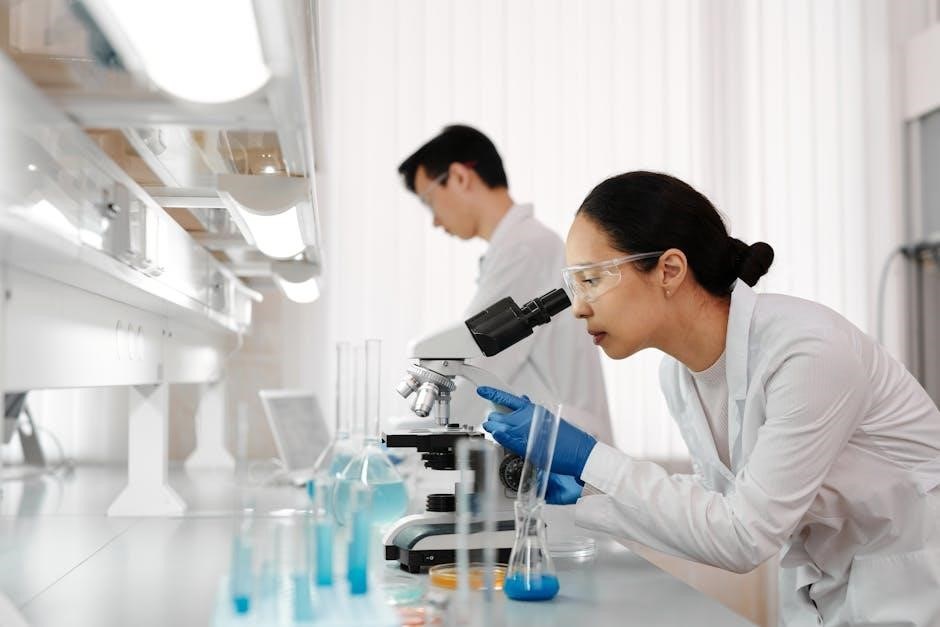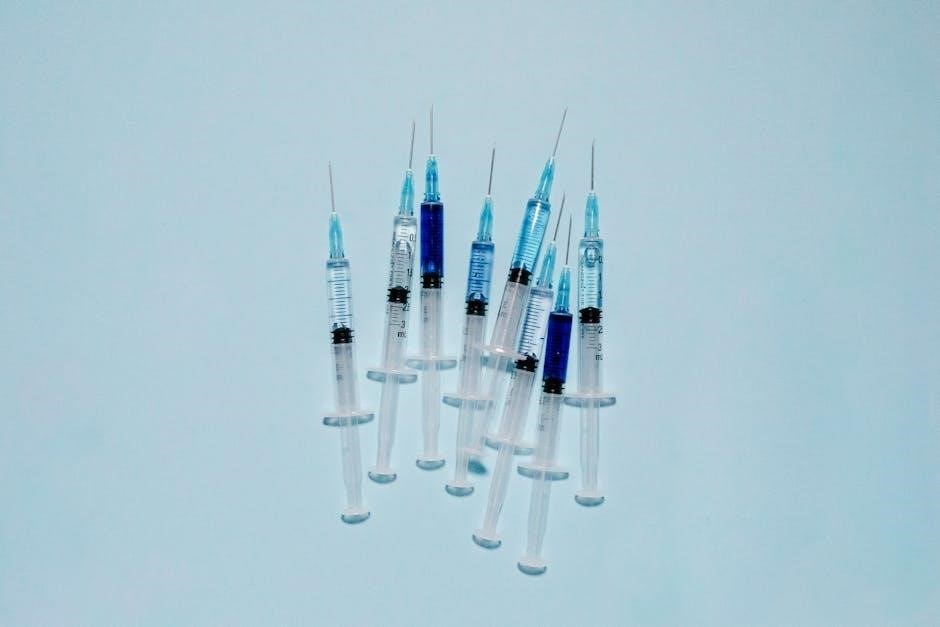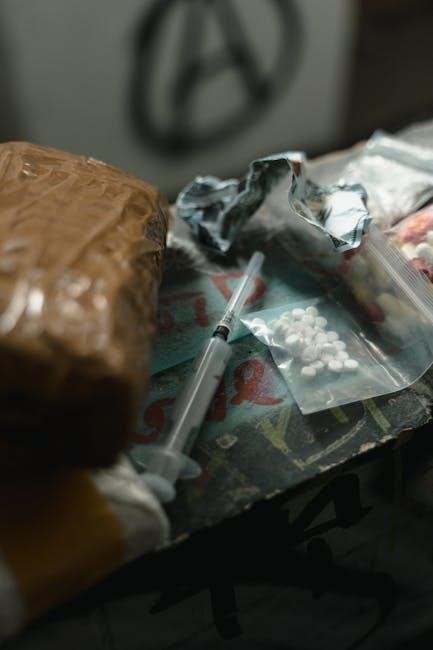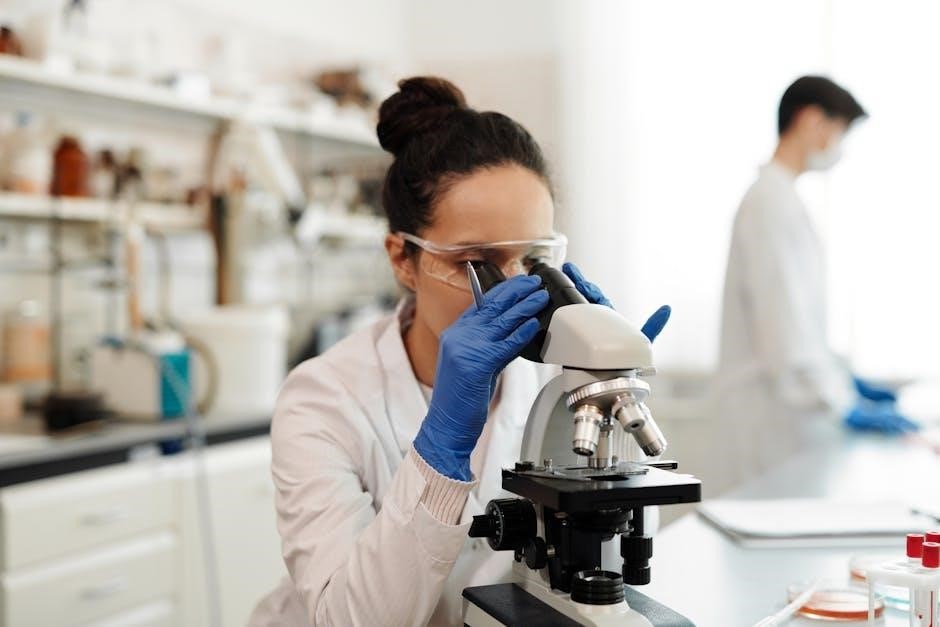Manual chemistry laboratory introduces students to basic techniques and procedures, including online nomenclature tests and observing chemical reactions, using laboratory manuals and standard operating procedures effectively always.
Overview of Laboratory Techniques
Manual chemistry laboratory techniques are designed to engage students in laboratory practices, including technique and exploration experiments.
The laboratory manual covers basic lab techniques, such as online nomenclature tests and observing chemical reactions.
Laboratory techniques are essential for students to learn and master, and include standard operating procedures.
Students are expected to follow laboratory manuals and guidelines to ensure safe and effective laboratory practices.
The laboratory techniques are introduced in a way that allows students to learn and practice chemistry laboratory skills.
The techniques include hands-on experiments and activities that help students understand chemical reactions and processes.
The laboratory manual provides step-by-step illustrations of experimental procedures, making it easy for readers to follow.
The techniques are designed to give students a comprehensive understanding of chemistry laboratory practices and procedures.
The laboratory techniques are an essential part of the manual chemistry laboratory, and are used to introduce students to the world of chemistry.
The techniques are used in various chemistry courses, and are an important part of the chemistry curriculum.
The laboratory techniques are constantly updated to reflect new developments and advancements in the field of chemistry.

Importance of Laboratory Safety
Laboratory safety is crucial, requiring compliant goggles, shoes, and medical consultation before taking chemistry lab, ensuring a safe learning environment always and effectively.
Standard Operating Procedures
Standard operating procedures are essential in a manual chemistry laboratory, outlining the steps to be followed in various experiments and tests, such as online nomenclature tests and observing chemical reactions.
These procedures are designed to ensure safety, accuracy, and consistency in the laboratory, and are typically outlined in a laboratory manual.
The manual will include information on the equipment and materials needed, the procedure to be followed, and any necessary safety precautions.
Students are expected to follow these procedures carefully, and to consult with their instructor if they have any questions or concerns.
By following standard operating procedures, students can ensure that their experiments are conducted safely and effectively, and that they obtain accurate and reliable results.
This is an important part of the learning process in a manual chemistry laboratory, and helps to prepare students for more advanced laboratory work.
Laboratory manuals and standard operating procedures are used to guide students.

Basic Laboratory Techniques
Basic laboratory techniques include measurement, mixing, and observation, using equipment and materials, following laboratory manuals and procedures effectively always in manual chemistry laboratory settings every day.
Introductory Laboratory Techniques
Introductory laboratory techniques are designed to engage students in chemistry laboratory practices, including technique and exploration experiments, to learn and practice chemistry laboratory skills, such as measurement and observation.
These techniques are typically introduced in the first semester of introductory chemistry courses, using laboratory manuals and standard operating procedures, to ensure a safe and effective learning environment.
Students learn to follow procedures, use equipment and materials, and develop essential laboratory skills, including data collection and analysis, to prepare them for more advanced laboratory work, and to secure opportunities for research work in a laboratory setting, with a competent chemist or expert experimentalist rating, and to consult medical professionals before taking chemistry lab, to ensure a safe and healthy experience, with proper goggles, shoes, and equipment, and to understand the importance of laboratory safety, and to develop good laboratory practices, and to learn from experienced instructors, and to use online resources, and to participate in laboratory discussions, and to complete laboratory assignments, and to evaluate laboratory results, and to draw conclusions, and to communicate findings, and to apply laboratory skills, and to think critically, and to solve problems, and to work collaboratively, and to demonstrate laboratory competence, and to achieve laboratory goals, and to develop a strong foundation, and to build laboratory confidence, and to succeed in laboratory work, and to pursue laboratory careers, and to make informed decisions, and to take responsibility, and to contribute to laboratory safety, and to promote laboratory excellence, and to foster laboratory innovation, and to support laboratory research, and to advance laboratory knowledge, and to improve laboratory practices, and to enhance laboratory education, and to provide laboratory training, and to offer laboratory guidance, and to facilitate laboratory learning, and to encourage laboratory exploration, and to inspire laboratory discovery, and to nurture laboratory growth, and to develop laboratory professionals, and to recognize laboratory achievements, and to celebrate laboratory successes, and to learn from laboratory failures, and to overcome laboratory challenges, and to achieve laboratory mastery, and to become proficient, and to gain expertise, and to make significant contributions, and to leave a lasting impact, and to create a positive influence, and to generate enthusiasm, and to spark interest, and to ignite passion, and to foster curiosity, and to stimulate creativity, and to develop critical thinking, and to improve problem solving, and to enhance communication, and to promote collaboration, and to build strong relationships, and to establish trust, and to demonstrate respect, and to show empathy, and to provide support, and to offer guidance, and to facilitate growth, and to encourage development, and to inspire excellence, and to nurture talent, and to recognize potential, and to celebrate achievement, and to learn from experience, and to gain wisdom, and to develop a strong sense, and to make informed decisions, and to take responsibility, and to contribute to the laboratory community, and to promote laboratory safety, and to support laboratory research, and to advance laboratory knowledge, and to improve laboratory practices, and to enhance laboratory education, and to provide laboratory training, and to offer laboratory guidance, and to facilitate laboratory learning, and to encourage laboratory exploration, and to inspire laboratory discovery, and to nurture laboratory growth, and to develop laboratory professionals, and to recognize laboratory achievements, and to celebrate laboratory successes, and to learn from laboratory failures, and to overcome laboratory challenges, and to achieve laboratory mastery, and to become proficient, and to gain expertise, and to make significant contributions, and to leave a lasting impact, and to create a positive influence, and to generate enthusiasm, and to spark interest, and to ignite passion, and to foster curiosity, and to stimulate creativity, and to develop critical thinking, and to improve problem solving, and to enhance communication, and to promote collaboration, and to build strong relationships, and to establish trust, and to demonstrate respect, and to show empathy, and to provide support, and to offer guidance, and to facilitate growth, and to encourage development, and to inspire excellence, and to nurture talent, and to recognize potential, and to celebrate achievement, and to learn from experience, and to gain wisdom, and to develop a strong sense, and to make informed decisions, and to take responsibility, and to contribute to the laboratory community, always following standard operating procedures, and using laboratory manuals, and participating in laboratory discussions, and completing laboratory assignments, and evaluating laboratory results, and drawing conclusions, and communicating findings, and applying laboratory skills, and thinking critically, and solving problems, and working collaboratively, and demonstrating laboratory competence, and achieving laboratory goals, and developing a strong foundation, and building laboratory confidence, and succeeding in laboratory work, and pursuing laboratory careers, and making informed decisions, and taking responsibility, and contributing to laboratory safety, and promoting laboratory excellence, and fostering laboratory innovation, and supporting laboratory research, and advancing laboratory knowledge, and improving laboratory practices, and enhancing laboratory education, and providing laboratory training, and offering laboratory guidance, and facilitating laboratory learning, and encouraging laboratory exploration, and inspiring laboratory discovery, and nurturing laboratory growth, and developing laboratory professionals, and recognizing laboratory achievements, and celebrating laboratory successes, and learning from laboratory failures, and overcoming laboratory challenges, and achieving laboratory mastery, and becoming proficient, and gaining expertise, and making significant contributions, and leaving a lasting impact, and creating a positive influence, and generating enthusiasm, and sparking interest, and igniting passion, and fostering curiosity, and stimulating creativity, and developing critical thinking, and improving problem solving, and enhancing communication, and promoting collaboration, and building strong relationships, and establishing trust, and demonstrating respect, and showing empathy, and providing support, and offering guidance, and facilitating growth, and encouraging development, and inspiring excellence, and nurturing talent, and recognizing potential, and celebrating achievement, and learning from experience, and gaining wisdom, and developing a strong sense, and making informed decisions, and taking responsibility, and contributing to the laboratory community, always following standard operating procedures, and using laboratory manuals, and participating in laboratory discussions, and completing laboratory assignments, and evaluating laboratory results, and drawing conclusions, and communicating findings, and applying laboratory skills, and thinking critically, and solving problems, and working collaboratively, and demonstrating laboratory competence, and achieving laboratory goals, and developing a strong foundation, and building laboratory confidence, and succeeding in laboratory work, and pursuing laboratory careers, and making informed decisions, and taking responsibility, and contributing to laboratory safety, and promoting laboratory excellence, and fostering laboratory innovation, and supporting laboratory research, and advancing laboratory knowledge, and improving laboratory practices, and enhancing laboratory education, and providing laboratory training, and offering laboratory guidance, and facilitating laboratory learning, and encouraging laboratory exploration, and inspiring laboratory discovery, and nurturing laboratory growth, and developing laboratory professionals, and recognizing laboratory achievements, and celebrating laboratory successes, and learning from laboratory failures, and overcoming laboratory challenges, and achieving laboratory mastery, and becoming proficient, and gaining expertise, and making significant contributions, and leaving a lasting impact, and creating a positive influence, and generating enthusiasm, and sparking interest, and igniting passion, and fostering curiosity, and stimulating creativity, and developing critical thinking, and improving problem solving, and enhancing communication, and promoting collaboration, and building strong relationships, and establishing trust, and demonstrating respect, and showing empathy, and providing support, and offering guidance, and facilitating growth, and encouraging development, and inspiring excellence, and nurturing talent, and recognizing potential, and celebrating achievement, and learning from experience, and gaining wisdom, and developing a strong sense, and making informed decisions, and taking responsibility, and contributing to the laboratory community, and to the development of laboratory professionals, and to the advancement of laboratory knowledge, and to the improvement of laboratory practices, and to the enhancement of laboratory education, and to the provision of laboratory training, and to the offering of laboratory guidance, and to the facilitation of laboratory learning, and to the encouragement of laboratory exploration, and to the inspiration of laboratory discovery, and to the nurturing of laboratory growth, and to the development of laboratory professionals, and to the recognition of laboratory achievements, and to the celebration of laboratory successes, and to the learning from laboratory failures, and to the overcoming of laboratory challenges, and to the achievement of laboratory mastery, and to the becoming proficient, and to the gaining of expertise, and to the making of significant contributions, and to the leaving of a lasting impact, and to the creation of a positive influence, and to the generation of enthusiasm, and to the sparking of interest, and to the igniting of passion, and to the fostering of curiosity, and to the stimulation of creativity, and to the development of critical thinking, and to the improvement of problem solving, and to the enhancement of communication, and to the promotion of collaboration, and to the building of strong relationships, and to the establishment of trust, and to the demonstration of respect, and to the showing of empathy, and to the provision of support, and to the offering of guidance, and to the facilitation of growth, and to the encouragement of development, and to the inspiration of excellence, and to the nurturing of talent, and to the recognition of potential, and to the celebration of achievement, and to the learning from experience, and to the gaining of wisdom, and to the development of a strong sense, and to the making of informed decisions, and to the taking of responsibility, and to the contribution to the laboratory community, always following standard operating procedures, and using laboratory manuals, and participating in laboratory discussions, and completing laboratory assignments, and evaluating laboratory results, and drawing conclusions, and communicating findings, and applying laboratory skills, and thinking critically, and solving problems, and working collaboratively, and demonstrating laboratory competence, and achieving laboratory goals, and developing a strong foundation, and building laboratory confidence, and succeeding in laboratory work, and pursuing laboratory careers, and making informed decisions, and taking responsibility, and contributing to laboratory safety, and promoting laboratory excellence, and fostering laboratory innovation, and supporting laboratory research, and advancing laboratory knowledge, and improving laboratory practices, and enhancing laboratory education, and providing laboratory training, and offering laboratory guidance, and facilitating laboratory learning, and encouraging

Advanced Laboratory Techniques

Advanced laboratory techniques involve complex organic chemistry lab procedures, requiring skilled experimentalists to master techniques, using detailed manuals and expert guidance to achieve successful outcomes always online.
Organic Chemistry Lab Techniques
Organic chemistry lab techniques are essential for students to master, involving complex procedures and experiments, such as synthesis and analysis of organic compounds, using various equipment and instrumentation, like spectrometers and chromatographs.
These techniques require a deep understanding of organic chemistry principles and reactions, as well as laboratory safety protocols and procedures, to ensure successful outcomes and minimize risks, with detailed manuals and expert guidance providing support and guidance.
Students can consult resources like The Organic Chem Lab Survival Manual and Techniques in Organic Chemistry to learn and master these techniques, with step-by-step illustrations and colored pictures and graphs, making it easier to follow and understand the experimental procedures, and to become proficient in organic chemistry lab techniques.
Manual chemistry laboratory concludes with mastered techniques and procedures, using laboratory manuals effectively always and successfully.
Future Opportunities
Students who successfully complete the manual chemistry laboratory course can secure opportunities for research work in a laboratory setting, applying the techniques and procedures they have learned. The laboratory manual provides a comprehensive introduction to the techniques of experimental chemistry, giving students a solid foundation for future studies. With the skills and knowledge gained, students can pursue careers in chemistry and related fields, such as research and development, quality control, and environmental monitoring. The course also prepares students for advanced laboratory techniques, including organic chemistry lab techniques, and provides a stepping stone for further education and training. By mastering the basic chemistry lab techniques, students can confidently move on to more complex and challenging experiments, exploring new areas of research and discovery, and making valuable contributions to the field of chemistry, with many future opportunities available to them.
